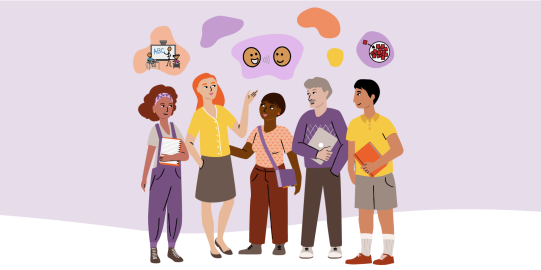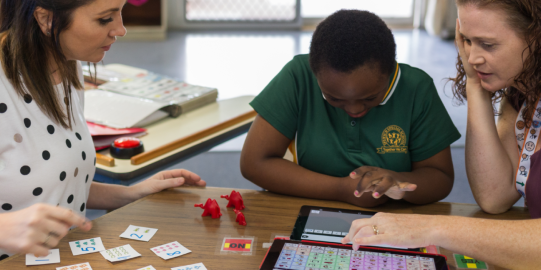The only way for a nonspeaking person to successfully use AAC to communicate is when we all work together. Where do we, as Speech Pathologists, stand on this? How is our role changing? How can you build collaborative relationships in your AAC teams?
The “real job” of an SLP is to build relationships
I’ve been a Speech Pathologist for over 25 years. I have worked in schools. I have worked with families.
I remember meeting a young adult’s family early in my career. They had been through many SLPs in their time. They still needed strong communication tools in place. They wanted me to do an AAC assessment and recommend an AAC tool. During the first appointment, I dedicated little time to talking to the young man’s parents. Most of my time was spent connecting with the young man himself. Showing that I was interested in him and his life. Showing that I was there to listen to whatever he wanted to tell me; however he wanted to tell it. I shared some of my AAC tools with him and explored them without pressure. At the end of the session, as we were getting up to leave, the mother asked me: “But don’t you want to know his diagnosis? Don’t you want to get his background history?” I shrugged and said that she could tell me if she thought it was necessary, but I wanted to get to know her son and family and that we would figure out things as we went along.
I have had that same conversation with families many times. As a Speech Pathologist, you need to learn to jump in, build connections and get to know the family right where they are now. Doing this is crucial to establishing trust and rapport early.
Similarly, in classrooms, learn to jump in with your AAC and join the teacher in whatever lesson or activity they are doing. You don’t need to know every detail of the students or the classroom beforehand. Join in and show how you can be a part of the classroom. Take time to consider the teacher’s perspective on working with AAC. Over time you will get to know the teacher and the students and, more importantly, how you can best support them. Don’t be the therapist who stands at the back of the classroom with a clipboard, taking notes. You’ll learn more by being all in than watching from the sidelines.
It is very easy for a Speech Pathologist to get hung up on assessments, reports, and decision-making. In fact, some research into therapists’ workloads suggests that most therapists do not perceive building trust and rapport with clients as “real” work. Instead, they list reports, assessments, and therapy sessions as “real” work. I argue that the opposite should be true. A Speech Pathologist’s core work is listening, observing, and building trust and rapport. Trust and rapport lead to open conversations, the chance to build shared understanding and better connections. This IS our real work.
The other (sometimes unexpected) benefit of this is discovering what is going wrong in the AAC team. Often teachers and parents might feel worried or scared to share their real thoughts and real AAC experiences with the SLP. They think the Speech Pathologist will judge them; that they will get in trouble for not doing what was asked or for not doing things “right.” When you have open communication, other team members are more likely, to be honest about roadblocks or problems. We need to know this. And we need to work collaboratively to solve these moments!
Don’t fall into the role of the “expert”
AAC teams work best when all team members have an equal role and an equal say.
It can be very common that the Speech Pathologist is considered the “expert” at the table. Some Speech Pathologists tend to be the “know-it-all” and often use complex terminology and language. Being the expert will build barriers in the team; it changes the balance and dynamic. It makes other team members seem to have less voice and say. It often may block open and honest communication.
It is more important for AAC teams to acknowledge the skills and expertise of all team members. I guarantee you that everyone has something to offer. Work with teams to let everyone offer their ideas and opinions and resist taking over. Establish early in your AAC teams that everyone has a role and that all voices will be heard. And when you are offering recommendations, learn to use everyday language to explain your ideas. Real change happens when teams work together to identify and solve problems collaboratively.
Understand that AAC users and parents of AAC users might have different motivations than you and the teachers. Parents might not have the capacity to take on all of your recommendations at home. Make it a point to check in and ask if this might be too much for them. Sometimes it can be challenging for a parent to share with you that they cannot take on another task. Checking in with them can make it easier for a parent to take a step back and consider what is possible for them to take on at home. Remind them that their most important job is to nurture their relationship with their child.
SLPs should not be gatekeepers of AAC
For many years, the only way to access AAC was through the Speech Pathologist. The traditional role of a Speech Pathologist doing an AAC assessment, trial, and recommendations - may not always be the case anymore. In today’s AAC world, AAC is much more accessible.
You may start supporting an AAC user whose mother went out and bought an AAC tool after seeing someone talk about it on social media! Nowadays, not all people who need AAC have gone through an assessment and recommendation process to get it.
Rather than fight or push back against this, embrace it! Never before have we seen AAC in the hands of those that need it with such speed. This has allowed us to expand our beliefs and ideals regarding WHO is eligible for AAC.
Don’t be a gatekeeper to AAC. Don’t stand in the way or block those people applying or trying to access AAC. Sprinkle AAC around like glitter. Anyone and everyone can benefit from AAC.
Our core beliefs as Speech Pathologists, for every individual we support, should be:




